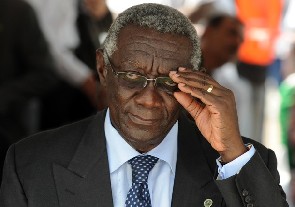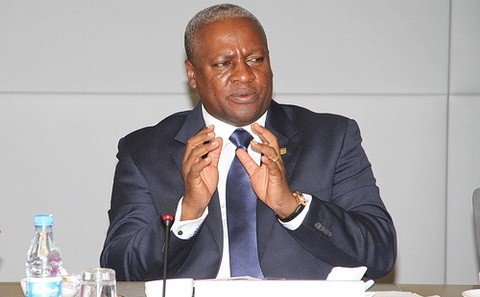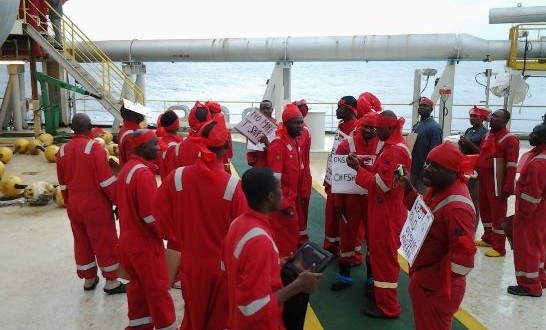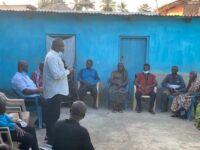 Judgment Debt Commission is questioning the appropriateness of $2.64 million land compensation payment authorized by former President Kufuor to a British Family on his last day in office.
Judgment Debt Commission is questioning the appropriateness of $2.64 million land compensation payment authorized by former President Kufuor to a British Family on his last day in office.
According to the Commission’s report, the land in question was leased in 1973 by some families in Aveyime –Battor in the Volta Region for to Battor Agricultural Industries Limited by one F. W. Clarke.
He made one D. A. Carmichael the Managing Director of the company. Three years later, government acquired the land for the Aveyime Livestock Project. But compensation was not paid.
Their lawyers, KORAH CHAMBERS of Accra in 1978 wrote to the government demanding compensation, it was still not paid. They wrote numerous petitions to government over the years until, during the Kufuor Regime, the British High Commission in Ghana sought to use diplomacy to get government to pay Carmichaels the compensation.
President Kufuor directed the payment of the US$2, 400,000 to the Carmichaels and a further US$240, 000 to their solicitor on his last day in office.
The report notes that the State Lands Act, 1962 is clear that the Lands Commission is the body which should undertake the evaluation and payment of land compensation.
But in this case “the quantum of compensation paid to the Carmichaels was determined by the President of Ghana” the report said.
The Lands Commission was not notified about this presidential directive and did not value the land for the compensation.
Again, the commission observes that, quote, “the instruction by the President to the Attorney-General to pay the US$2, 640,000, the directive by the Attorney-General to the Minister of Finance following the instruction from the President and the request by the Minister of Finance to the Controller and Accountant General to release the money all happened on the same day, i.e. 6th January 2009; the eve of the President’s exit from office.
The tantivy with which the whole exercise was carried out on the President’s last day in office calls into question the propriety of the payment.”
Read full details of the report on the land compensation and actions undertaken by President Kufuor leading to the settlement.
COMPENSATION CLAIM BY THE CARMICHAEL FAMILY; IN RE: AVEYIME LIVESTOCK PROJECT
In the Auditor General’s Annual Report of 2011 to the Parliament of Ghana, it was stated that the Government of Ghana paid an amount of US$2, 400,000 to a family called Carmichael Family as compensation for a piece of land acquired by the State in 1976. The report also stated that a further US$240, 000 was paid by Government to the solicitors of the Carmichael Family.
3.6.0 FACTS By Executive Instrument (E.I.) 27 of 21st February 1976, the State acquired approximately 24, 790 acres of land at Aveyime – Battor in the Volta Region for the Aveyime Livestock Project (ALP). Before the State acquired the land in 1976, part of the land so acquired had already been leased out in 1973 by some families to Battor Agricultural Industries Limited (BAIL); a Holding Company managed by one F. W. Clarke (Gh) Limited.
The area acquired for the Battor Agricultural Industries Limited was 1,854.84 acres. Out of this, 1,851.37 acres fell within the land acquired by the State per E.I. 27 of 1976.
(a) The relationship between BAIL & the Carmichael Family Information gathered by the Commission on a research finding made during a visit to Aveyime-Battor by research officers of the Commission was that, before the acquisition by F. W. Clarke (Gh) Ltd., there was a cotton development project at Aveyime-Battor by one Bates whose nationality has not been established. Though it is not known how Bates came onto the land, oral tradition had it that he acquired the land through marriage to an indigene in the area. Possibly, the Carmichael family who were friends to Bates took over the cotton plantation after Bates had left the country. When F. W. Clarke acquired the land and created BAIL, he made D. A. Carmichael the Managing Director of the establishment.
(b)The Claim by Solicitors of Carmichael for Compensation After the State had acquired a chunk of the BAIL lands, the solicitors of the establishment by name KORAH CHAMBERS of Accra, in 1978, wrote to the then Chief Lands Officer and requested for a compensation of three hundred and thirty thousand old cedis (c330, 000.00) now thirty-three Ghana cedis (GHc33.00) to be paid to their clients; i.e. BAIL for both land and buildings lost as a result of the State acquisition.
The Commission noticed that E.I.27 was dated 21st February 1976 while the lease to BAIL was dated 1st January 1976. Judging from the fact that E.I.’s on State acquired lands are issued long after the compulsory acquisition, it could be that the land was earlier acquired by Government before the lease to BAIL was made.
There is no record before the Commission to indicate that the Chief Lands Officer responded to the solicitors’ letter of 31st January 1978. However, there is an indication that the solicitors wrote again to the Chief Lands Officer on 15th July 1981. The Chief Lands Officer replied to this second letter on 27th July 1981. In this reply, the Chief Lands Officer offered the sum of two hundred thousand and forty old cedis (c200, 040.00) now approximately twenty Ghana cedis (GHc20.00) for structures belonging to BAIL that were affected by the State acquisition. This offer of c200.040.00 was unconditionally accepted by the solicitors of BAIL on 29th July, 1981.
From the solicitor’s letter of 31st January 1978, c200, 040.00 was quoted as the valuation price of the buildings and c129, 960.00 for land. The position of the Chief Lands Officer to offer compensation of c200, 040.00 for structures only without any mention of land compensation goes to buttress the Commission’s suspicion that the State might have acquired the land earlier but delayed in issuing an E.I. to cover it; suggesting that BAIL was not entitled to any land compensation. Indeed, if BAIL had any interest in the land at all, it will be the remaider of the term of years acquired in the lease, if any.
(c)Revision or Revaluation of Compensation Value On 5th March 1987, the then Attorney-General Dr. Obed Asamoah per a letter with reference number D.4/SF.8, requested the then Land Valuation Board (LVB), now Land Valuation Division of the Lands Commission (LVDLC) to review the valuation placed on the portion of land expropriated from BAIL. The LVB responded on the 9th of June 1987 that the State Lands Act, 1962 [Act 125] did not permit or allow for review of valuation.
The L.V.B. further advised Government to review the law; i.e. Act 125 and its corresponding regulations to accommodate the situation if that was the wish of Government but warned that any such decision would become a precedent for future reference. With this advice, the law was never reviewed or amended. It has remained as it was to this date.
Notwithstanding this position of the law, the LVB was given pressure by Government to carry out a re-valuation of the property in 1993. This raised the value of the structures of BAIL from c200, 040.00 to c45, 300,000.00. A further re-valuation of the same land was made in the year 2000 by the LVB this time putting the value at c775, 223,000.00; now GHc77, 522.30.
The re-valuation of the expropriated land of BAIL flies in the face of the law even if the re-valuation was as a result of delayed payment of compensation. The law is explicit that in case of a delay in the payment of compensation, the initial assessed value be placed in an interest-yielding escrow account. This is to compensate for any erosion in value of the assessed amount. This position of the law has been given enough coverage in the introduction to this chapter.
(d)Was the Battor Agricultural Industries Limited (BAIL) a Going Concern? The BAIL was established in 1973 on a 50-year leased land. At the time the State expropriated the land, the main building to house its production unit had not been completed. The position was corroborated by the claimant’s own valuation report which he used as the basis of his claim for compensation. Again, the valuation report was silent on claims for crops and for cultivated or prepared land.
It follows logically therefore that, the business had not even taken off at the time the State expropriated the land let alone it being a going concern. A claim of loss of profit put in by BAIL in the compensation package was therefore fraudulent and it was re-assuring that the LVB professionally advised against it.
According to the original valuation report submitted by BAIL to the then Chief Lands Officer, the assets of the Company at the time of acquisition by the State were: –
A completed canteen block A wooden structure One uncompleted factory block at roofing stage One toilet block at foundation stage, and One factory block at trenches stage (e)The Position of the Attorney-General’s Office The raging battle over the payment of compensation spanned a period of thirty (30) years. During this period, several attempts were made to resolve the matter. Successive Attorney-Generals were not left out in the negotiations. Apart from the various letters written by officials at the A-G’s Department, the contributions of three key players in the helm of affairs at the Department need special mention.
Dr. Obed Yao Asamoah: He was the Attorney-General and Minister of Justice for a very long time. In 1993, he sent a memo to Cabinet on this case. In the said memo, he catalogued the various actions taken to settle this matter but to no avail. He reminded Cabinet of the possible loss of investor-confidence in Ghana if this compensation issue was not resolved or handled with tact.
He again reminded Cabinet that the issue involved a foreign national to whom there must be “prompt, adequate and effective payment” for expropriated assets. He cautioned Cabinet on a possible settlement at International Courts where the ruling might be detrimental on the financial vault of Ghana. He therefore urged Cabinet to approve the payment of c45, 300,000.00 as compensation to BAIL. This was the figure arrived at after the LVB had been ordered to revalue the property against the provisions of the law. Dr. Obed Asamoah entreated Cabinet to treat the case as a special one even though, to quote his own words; “the law enjoins the Government to pay as compensation the value of the property acquired as assessed at the time of the acquisition”.
On 11th July, 1994, Dr. Obed Asamoah wrote another memo to Cabinet saying that F. W. Clarke (Gh) Ltd did not accept the offer of c45, 300,000.00 for reasons listed in the memo. He therefore requested Cabinet to approve an advice by the LVB that the issue be referred to the Ghana Institute of Valuers for final determination.
Nana Addo Dankwa Akuffo-Addo: He became the Attorney-General and Minister of Justice in 2001. In an unreferenced letter dated 10th April, 2001 to the British High Commissioner in Ghana, the Attorney-General stated his desire to bring finality to the long standing dispute between F. W. Clarke (Gh) Ltd represented by the Carmichael Family and the Government. He therefore requested the Carmichaels to send through the High Commissioner some documents to propel the process of payment. He stated categorically that he disagreed with the claim of over twenty million dollars (US$20 million) being made by the Carmichaels and requested a meeting with them for a possible resolution of the matter. The Commission did not chance on any document to suggest that the request by Nana Akuffo-Addo was ever complied with. This could be attributed to his short term as the Attorney-General as he was later moved to the Foreign Affairs Ministry.
JUSTICE V.C.R.A.C. Crabbe: On his last day in office; precisely on 6th January 2009, former President His Excellency J. A. Kuffour allegedly instructed that the sum of US$2, 400,000 be paid as compensation to the Carmichael Family in respect of the Aveyime Livestock Project. There was a further directive that US$240, 000 be paid to the solicitors in charge of negotiations for the payment of the required compensation for and on behalf of the Carmichael Family. These were contained in a letter dated 6th January 2009 signed by Justice V.C.R.A.C. Crabbe for and on behalf of the Attorney-General.
These references made above on the various roles played by the Attorney-General’s Department show that at all material times, the A-G’s Office held the view that some compensation was due the Carmichaels. The bone of contention had always been the quantum of money due the claimant.
(f)The Involvement of the British High Commission The delay in the payment of compensation to the Carmichaels resulted in the British High Commission being drawn into the matter. The Carmichaels, being British nationals and investors in Ghana, sought to use diplomatic means to get their due either justified or not.
Information gleaned from Dr. Obed Asamoah’s memo to the Cabinet Secretary dated 17th December, 1993 suggested that an Aid Memoire from the British High Commission to the Minister of Foreign Affairs asked the Government of Ghana to “reconsider the question of compensation again”.
Similarly, the Attorney-General’s letter of 31st March 2011 addressed to the Chief Director, Ministry of Finance & Economic Planning suggested that an agreement had been reached between the British Government represented by Baroness Chalker and the Ghana Government represented by the late Mr. P.V.Obeng on the same compensation issue.
The letter which was signed by Mr. Justice V.C.R.A.C. Crabbe who is the Commissioner of the Statute Law Revision for and on behalf of the Attorney-General stated, dishearteningly as follows: “It had been difficult – very, very difficult – in getting to know the formula which was agreed upon”.
The letter by Nana Akuffo-Addo to the British High Commissioner on the 10th of April, 2001 also suggested that the British High Commission was determined to protect their own. In that letter, the then Attorney-General was responding to a request (either verbal or written) by the High Commission.
3.6.1 FINDINGS /OBSERVATIONS
(a) Valuation of Land
There is no question to the fact that a greater chunk of the leased property of the Battor Agricultural Industries Limited (BAIL) was expropriated by the State when Government by E.I. 27, acquired a 24,790 acre land at Aveyime in the Tongu District of the Volta Region for the Aveyime Livestock project. As a result of this acquisition, the Company contracted a private valuer in the person of M.R.K. Jonas to value the expropriated property to enable it claim compensation from Government.
The private valuer valued the expropriated property at c330, 000.00 (now GHc33.00) but the Lands Department which was the State institution responsible for the payment of compensation on State acquired lands, offered c200, 040.00 (now GHc20.00) in 1981 as adequate compensation, which offer the Company/Claimant accepted. The accepted offer was never paid for reasons this Commission could not fathom.
Strangely enough, the Attorney-General who is the legal advisor of Government and is supposed to defend the laws of the land, rather at various stages of the claim, turned our law on compensation payment upside down by directing the Lands Department to revalue the land at “current values” for the purposes of paying compensation to the claimants. This was done in July 1993, April 2000 and November 2001.
On all three occasions, the values placed on the same expropriated property were c45, 300,000.00 (now GHc4, 530.00); c775, 223,000.00 (now GHc77, 522.30) and c978, 000,000.00 (now GHc97, 800.00) respectively. All these monies though wrongly computed, were however not paid at the various stages of revaluation for unknown reasons.
At the time the then Attorney-General Dr. Obed Yao Asamoah was giving these directives to the Lands Department, he knew they were contrary to the law. In his memo of 17th December 1993 to the Cabinet Secretary, he stated emphatically that; “the law enjoins government to pay as compensation the value of the property acquired as assessed at the time of acquisition”.
Even before then, precisely in 1987 when the first request was made by the A-G for a revaluation to be done, the Chief Lands Officer at the time drew the A-G’s attention to the law when he wrote back saying that; “the State Lands Act, 1962 [Act 125] does not make any provision for revaluation hence the A-G’s Department could not authorize revaluation of the property”.
Notwithstanding these clear provisions of the law, the hands of the then Lands Department were twisted to comply with the directives, which were a clear breach of the law, all because the claimants involved were foreigners and needed special attention irrespective of what our law says.
It is trite knowledge that the State Lands Act, 1962 [Act 125], does not allow for revaluation or review of compensations based on current values of acquired lands. It is therefore surprising that various lawyers at various times requested the Land Valuation authorities to revalue the land under discussion. It is even more intriguing that former Attorney-Generals were included or involved in this crucifixion of the law on the mere ground that the claimants were foreigners so our laws did not matter.
(a)The Directive of the President
This Commission admits that all public lands in Ghana are vested in the President on behalf of and in trust for the people of Ghana vide Article 257 (1) of our Constitution (1992). By virtue of Article 258 (2) of the said Constitution the President could, through the Minister responsible for lands and natural resources give general directions in writing to the Lands Commission on matters of policy, which directives the Commission is obliged to comply with. This Commission is however of the view that such directives must be given within the confines of the law.
The State Lands Act, 1962 [Act 125], which governs compensation payments for lands acquired for public purposes charges the Lands Commission as the State institution with the mandate to determine fair and adequate compensation to be paid and there is a formula for doing that. This Commission noted, however, that the quantum of compensation paid to the Carmichaels was determined by the President of Ghana. This was done when he allegedly instructed the Attorney-General through Justice V.C.R.A.C. Crabbe to request the Ministry of Finance and Economic Planning (MoFEP) to release US$2, 400,000 to the Carmichaels and a further US$240, 000 to their solicitor.
Unfortunately, the Lands Commission was not notified about this directive. When this Commission, therefore, requested the Lands Commission to provide it with information on the payment, it responded by saying that it had no records on the said payment as the Office was not involved in the assessment of the compensation.
The questions that need to be asked are:
On what basis was the quantum of compensation arrived at? Was the decision in conformity with our laws on compensation payments for State acquired lands?
What role did the so-called solicitors play in securing the payment of the compensation for them to be entitled to the payment of ten per centum (10%) of the amount; i.e. US$240, 000?
Who did the assessment?
Again, it was F.W. Clarke (Gh) Ltd that established the Battor Agricultural Industries Ltd (BAIL) and it was this Company whose property was expropriated. The company so formed thus became a separate entity from the individual who established it. In paying Compensation therefore, the money should have gone into the account of the Company; i.e. BAIL. Payment was however made to the Carmichael Family. The Commission was at a loss as to why the compensation was not paid to the Company or F.W. Clarke (Gh) Ltd but to Carmichael who was the Managing Director of the Company. The question therefore is; why was the money paid to the Carmichael Family?
(b)Current situation on the Ground
The land parcel of about 24, 790 acres acquired by E.I. 27 of 1976 was owned by a number of families in the Battor area. The Battor Agricultural Industries Ltd (BAIL) only had a 50-year leasehold interest in just about 1,854.83 out of the lot, leaving almost a vast area of 23,000 acres belonging to indigenes. Apart from BAIL whose compensation has been paid to the Carmichaels, none of the actual land owners has been paid even a pesewa since 1976.
Even, according to LVB’s letter addressed to this Commission, there were eight conflicting claims over the area claimed by BAIL alone. These conflicts were not resolved before the payment in dollars was made to the Carmichaels. Does it mean that the real owners of the land, who have been deprived of their ownership for ever, do not matter at all to the State?
(c)The Carmichaels Renewed interest in Ghana
The unreferenced letter dated 31st March 2011 signed by Justice V.C.R.A.C. Crabbe for and on behalf of the Attorney-General and Minister of Justice and addressed to the Minister of Finance and Economic Planning, which has been referred to supra, gave a hint of the Carmichaels’ desire to come back to Ghana to invest in the agricultural sector, specifically in cocoa products.
In that letter, it was stated that the Carmichaels would still need 1,800 acres of land for lease in a cocoa growing area for that purpose. The letter suggests that the Carmichaels were expecting certain favours (lease renewals and tax concessions) from Government, after squeezing a total of US$2, 640,000 from Government as compensation. This Commission seriously thinks they were not entitled to that amount going by the formula for determining compensation for lands acquired for public purposes.
This Commission holds the view that all genuine investors who want to invest in the country without ulterior motives should know the various institutions of State; e.g. Ghana Investment Promotion Centre (GIPC), etc. to contact for advice and not be seeking favours from Government within the corridors of power.
After using the British High Commission to pepper our Government to get what under our laws they did not deserve and would not have been entitled to, the Carmichaels now have the impudence to return to the country with their booty to seek further special favours in a so-called investment drive in the cocoa sector to invest what they manoeuvred to grab from the State, albeit unjustifiably.
3.6.2 LESSONS LEARNT AND RECOMMENDATIONS
The Government must be mindful of the fact that as much as the Constitution permits or allows the State to acquire lands in the public interest and for public purposes, the same Constitution enjoins the State to pay prompt, fair and adequate compensation to land owners whose lands are compulsorily acquired. It is therefore incumbent on every Government to ensure that funds are readily available before any compulsory acquisition is embarked on for any public project. Such a policy is meant to avoid the State being dragged to court years later for the payment of unwarranted judgment debts that would defeat the purpose of the acquisition as happened in this case.
When the land was acquired in 1976, the assessed value of compensation for the portion owed by BAIL measuring about 1, 800 acres which the Company accepted was c200, 040.00 (now GHc20.00). This amount was, however, not paid. About thirty years down the line, the State was made to cough out US$2, 640,000 for the same piece of land, when nothing had been paid to the indigenous land owners who owned the remaining 23,000 acres. The Commission views this as quite insensitive, unconscionable and unfair to the local people and their children yet unborn, who have lost their land for ever as a result of this acquisition, the purpose of which had totally failed.
Right now, the Aveyime Livestock Project, from a visit made to the farm by a research team from this Commission, is a pale shadow of the intended project. The project, which is currently being managed by the Ministry of Finance, has a staff strength of about twenty (20) whose salaries or wages have been in arrears for about two years now. Something serious must be done to save the project from total collapse.
The State and her institutions should understand that bureaucracy does not mean time wasting. Bureaucracy is to streamline procedures and allow for transparency. Obviously, procedures for payment of compensation should not take decades or a whole generation to complete. It is this bureaucratic tendency that has caused the State to pay US$2, 640,000 as compensation to the Carmichaels instead of GHc20.00 which could have been paid thirty years earlier.
Again, State Institutions must be respected by higher authorities. The Lands Commission and its divisions have been mandated by the Constitution and the laws of Ghana to perform specific functions. Their professional expertise is to be tapped by State Officials. It is, therefore, a pity that Government Officials ignored their expert advice on re-valuation of acquired property.
The Commission would also like to state, with all humility and respect to the Office of the President that, Presidents of the State must not take unilateral decisions to the detriment of the State. From records available to this Commission, it was the President who instructed that the State should pay US$2, 640,000 to the Carmichaels. There is no record to show the basis on which such a determination was made.
If the President had directed the Lands Commission to assess the compensation due in line with the provisions of the law, which bind all citizens of the land including the President, he would have been advised that there were conflicting claims over the land. No wonder, officials of the Land Valuation Division of the Lands Commission told this Commission when they appeared before it in 2014 that they were not aware of any payment of compensation to any of the claimants including Battor Agricultural Industries Limited (BAIL), which had already received on the benevolence of the President, a whopping sum of US$2, 640,000.
Again, though the Constitution mandates the President to a four-year term in office ending on the 6th of January, the timing of some actions by the President must be regulated. The instruction by the President to the Attorney-General to pay the US$2, 640,000, the directive by the Attorney-General to the Minister of Finance following the instruction from the President and the request by the Minister of Finance to the Controller and Accountant General to release the money all happened on the same day, i.e. 6th January 2009; the eve of the President’s exit from office. The tantivy with which the whole exercise was carried out on the President’s last day in office calls into question the propriety of the payment.
Government should be circumspect in dealing with foreign investors. Without circumspection, the powers that be may be twisting the arms of Government as did the British High Commission in this Carmichael affair.
Since records available to the Commission show that other claimants have their claims pending for years before the Lands Commission and that the actual owners of the Aveyime-Battor acquired lands have not been paid any compensation, this Commission recommends to the Government to do well to pay these locals their due as early as possible to avoid any unpleasant situation in the near future.
Secondly, the Government must do well to revive the livestock project currently on the land since reports indicate that it is a viable entity. This will go a long way to provide jobs for the people in the area who have been deprived of their farming activities on the land as a result of the acquisition. The revival will also forestall any encroachments by other people as has happened in several cases on State acquired lands that have been under-utilized.





